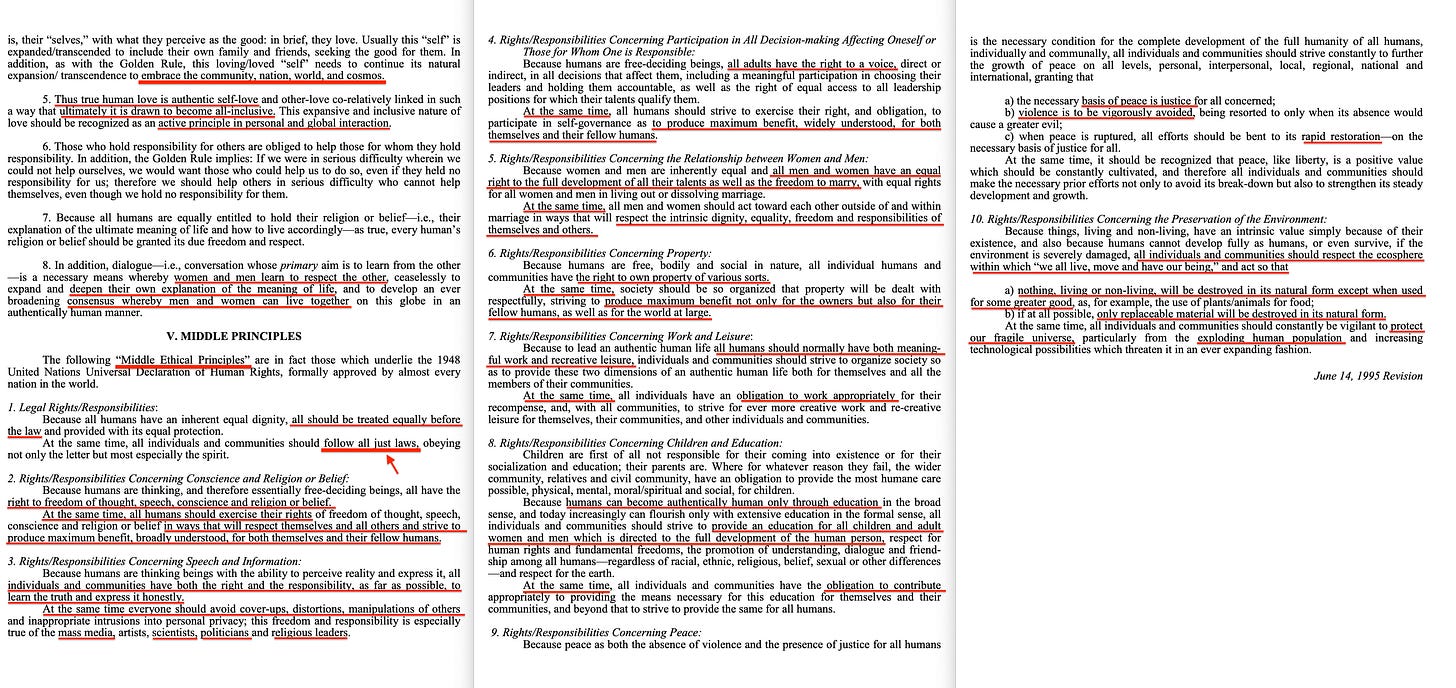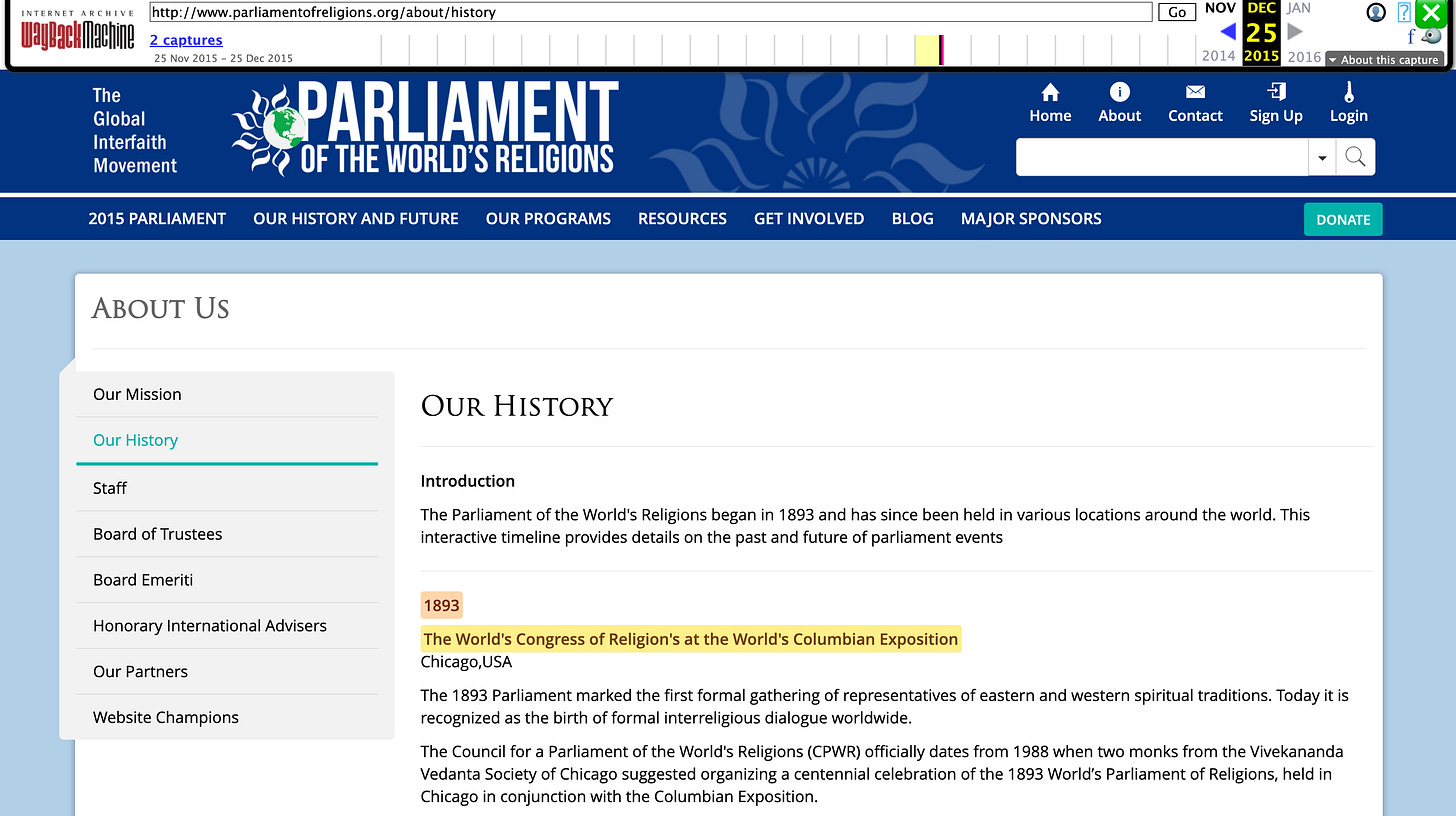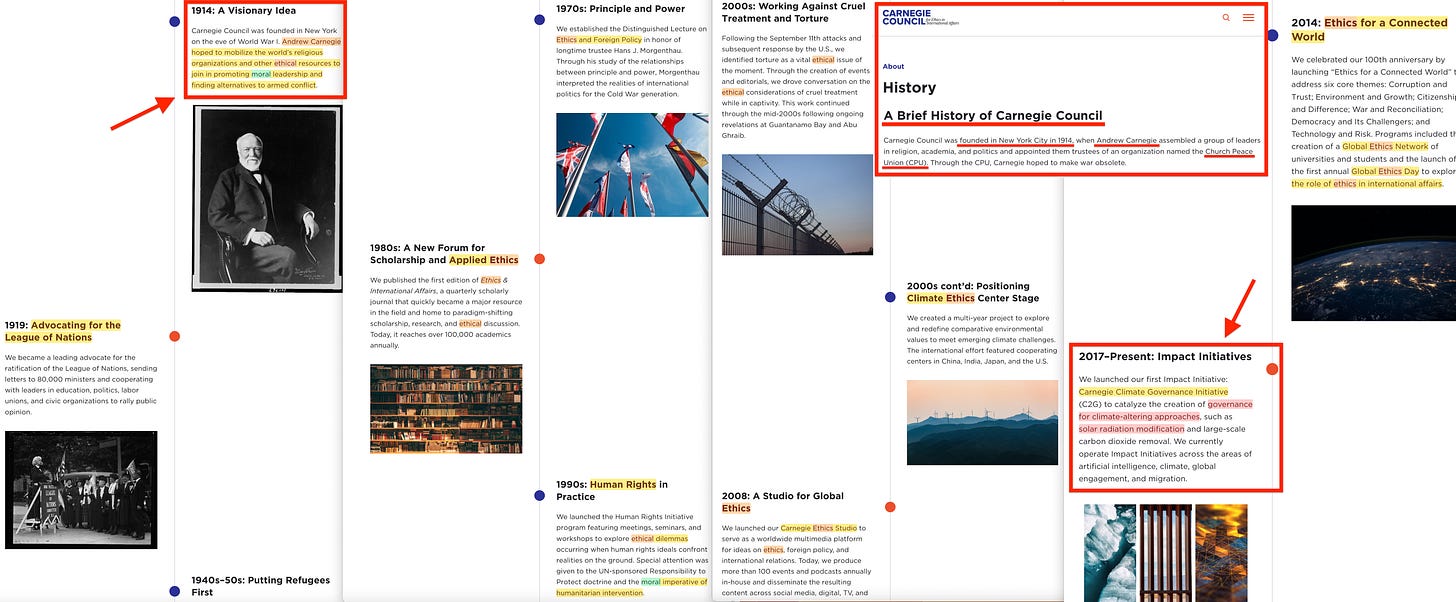A Global Ethic
We face an increasing amount of calls for ‘Global Citizenship’. Of course, said can’t exist without some level of framework, and though the United Nations at present - utilising complicit national parliamentarians - does everything it can to undermine sovereignty (though claiming to ‘strengthen’ said), a legal framework alone is will simply not cut the mustard.
No, what’s needed is a Global Ethic.
Let’s kick off with this United Nations Chronicle article from 20181 which couldn’t be more explicit if it tried - ‘Global Citizenship: A New and Vital Force‘.
‘Throughout this period of over seventy years, the United Nations has played a key role in enabling the concept to mature and adapt to the reality of globalization in its various aspects. It is now understood as a type of citizenship that transcends what is purely national, is unrelated to a specific identity and/or territory, and embraces a constantly evolving global ethic.‘
It’s fairly telling, really. Sovereignty is clearly not the primary concern in our globalised world, no, what’s required is the development of a new ‘type of citizenship’, which ‘embraces a constantly evolving global ethic’.
And that’s of interest, not only as it closely resembles the continuous calls at present for ‘life-long learning’ - and there are plenty2 of3 examples4 to5 pick6 from7 - but also because of said ‘constantly evolving global ethic’
The article continues -
‘Global citizenship exists at various levels, in numerous contexts and at different times, with no single identifiable institutional framework. In the new world order, it seeks to expand its scope and democratize a decision-making process that can radically affect basic aspects of our societies, especially in people’s lives, particularly those of minorities and the disadvantaged. Global citizens act without limits or geographical distinctions and they do so outside the traditional spheres of power. Their goal is to defend human dignity and to promote social accountability and international solidarity, in which tolerance, inclusion and recognition of diversity occupy pride of place in word and deed, reflecting the multiplicity of actors involved in the actions of global citizenship.‘
Global citizenship, the new world order, international solidarity, tolerance, diversity… I mean, what’s not to like?
The first stop on our search for said Global Ethic is 19938. Helpfully, there’s a Wiki article on just that, from which we learn that -
‘"Towards a Global Ethic: An Initial Declaration" is a 1993 document by members of the Parliament of the World's Religions that details ethical commitments shared by many of the world's religious, spiritual, and cultural traditions.‘
Right, so all the religions are involved, and -
‘On May 20, 2007, the founder of the Global Ethic Foundation, Hans Küng, received the Culture Award of German Freemasons by hands of the German Grand Master Jens Oberheide who presented him as a "free and brave thinker" and a man who spoke "straight from our Masonic hearts"‘
Oh great, the freemasons are involved!
The - now broken - Wiki link leads to a german site9, but before we go there, let’s take a look at a similar document from 1995, titled ‘UNIVERSAL DECLARATION OF A GLOBAL ETHIC‘10 penned by Leonard Swidler… which is a lot shorter. Should give us somewhat of an executive summary before we dive into detail.
It’s about a ‘fundamental attitude toward good and evil’, about ‘support of universal human rights’ (ah, human rights), ‘justice and peace’, and - somewhat timely - ‘conservation of the earth’. I don’t know about you, but already here it starts to smell a bit.
It carries on with the old ‘interdependence’ chestnut, ‘justice and human rights’, and an advocacy of a ‘movement towars a global order’. For this we need a ‘global ethic’, which is a set of ‘universally-recognised norms and principles’, and ultimately, a ‘movement of the heart’ - aka an appeal to emotion, rather than reason.
And much like with ‘climate science’ it seeks a ‘consensus on ethics’ to ‘provide us with a moral framwwork within’, and thus ‘build a humanity-wide consensus’. This is manipulative garbage, in short, which naturally links right up with the 1948 Universal Declaratio of Human Rights of the United Nations.
It then lines up 5 rules in the presuppositions;
We are obliged to respect and protect the dignity of each person
No person or social entity exists beyond the scope of morality, and this, we are all obliged to ‘do good and avoid evil’, which is great news for those who seek to dictate good from bad in a pretense of moral absolutism existing.
We must act conscientiously, as though most ever don’t.
Communities, societies which ‘contribute to the good of humans and the world’ have a right to exists, again calling for a… House of Justice, perchance?
Humans are part of nature… and ethical concerns are not just anthropo-centric, but cosmo-anthropo-centric.
That… got a little weird. From a ‘Berlin Principle’ view of the relative worth of humans vs nature to the cosmos! Almost… Planetary…?
Regardless, the overriding rule is the old ‘do onto others’, which the many, many politicians exempting themselves from Covid-19 vaccinations in New Zealand alone clearly didn’t play ball with (so why should we?), and onto the basic principles and thus, the endless exceptions to their rules, penned out of a principle of… exclusive self-interest…?
‘Freedom is of the essence of being human… so long as it does not infringe on the rights of other persons or express a lack of due respect for things living or non-living’.
I mean, you’d have though it was a joke - respect for things non-living. Make fun of a tree, and consider your freedom license revoked!? But sadly, this really is just the warm-up act of this insane drivel.
‘As humans necessarily seek ever more truth, so too they seek to unite themselves’ - why, exactly? Perhaps the truth is that some cultures are not a great fit? Perhaps women get pleasure from other values but men? Not all ‘truths’ mean we should ‘unite’, and who’s even to say which ‘facts’ are more important than others? This is nothing short of politically expedient drivel pretending it’s not.
We carry on, learning that ‘human love is authentic self-love’, which ultimately is ‘drawn to become all-inclusive’. I mean, it’s obvious what the subliminal message here is, but let’s pretend we don’t get it, and carry on with… all the exceptions. Well, soon we learn that men and women apparently haven’t yet learned to live with one another.
Take that, all you married people.
First we have the ‘Middle Ethical Principles’ which dictate that ‘all should be treated equally before the law’, yet all should ‘follow all just laws’ is a curious addition, because who’s to say a law isn’t ‘just’? Antifa?
And here cometh the ‘at the same time’ section -
All should ‘have a right to free speech’… unless this isn’t respectful of others, or ‘strives to produce maximum benefit’… according to whom, exactly?
All should ‘be responsible to learn the truth and express it honestly’… and ‘avoid cover-ups, distortions, manipulations of others’… I spot rather a lot of manipulation in this document already by now, quite frankly. The inclusion of ‘mass media, scientists, politicians, and religious leaders’ is just the icing on top, because that’s a broad outline of all those who most certainly do not follow said ‘ethical guidelines’.
Let me just zip through these ridiculous entries quickly -
All should have a right to a voice… as long as it’s used correctly, all should have the right to development of talents and marry… as long as it ‘respects the intrinsic dignity of themselves and others’ (whatever that’s supposed to mean), all should have the right to ‘own property of various sorts’… as long as it ‘produces maximum benefits for the world at large’ (no, i am not making this up), all should have the right to meaningful work and recreative leasures… as long as they have ‘an obligation to work appropriately’, all have a right to an education… as long as they accept their ‘obligation to contribute’.
See, it’s not so much about which rights you have as opposed to those you don’t. And that’s really the key issue here. Rights and liberties are not granted - they’re taken away - and that, usually by authoritarian politicians.
But the next is the worst of the lot, because in just a few lines, we learn of -
The necessary basis of peace is justice for all.
Violence is to be avoided - unless its absense would cause a greater evil.
When violence breaks out, all efforts should lead to rapid restoration.
They carry on, detailing that ‘all individuals should make the necessary prior efforts…’, which is somewhat suspicious because who’s to say that if someone didn’t, it justifies violence per (2) above? Whose judgment call exactly would that be?
Finally, it concludes by dragging in ‘the greater good’ as an umbrella term justifying the destruction of anything, living or non-living. Yeah, I know it states the opposite, but this is the perversity of the language, because that’s the game clearly being played here, there and everywhere. Once you spot it in especially United Nations documents, you realise exactly with whom you deal.
Also, as a great introductory course on these manipulative practices, may I recommend marxists dot org (sadly not a joke)?
Oh yeah, and finally - don’t allow human population to explode (or you could end up with a bit of the old ultra-violence).
Of course - the overriding message here is -
Who get to judge all these judgment calls, now that the legal framework has been shoved to the side, replaced by arbitrary ‘ethics declarations’?
With that in mind, let’s zip back and look at the original11. And it is similar. Very, very similar. But there are a few differences.
Penned in 1993, it details the destruction of the planet, of the ecosystems, the poverty, hunger, social disarray, lack of justice, violence, aggression, hatred and so forth. Then states that a basis for an ethic already exists, which will lead to better individual and global order. This common set of core values will be found in the various religious teachings, and should form the basis of a global ethic, ultimately leading to a sustainable world order.
We then - allegedly - declare that we are interdependent, concerned about collectivism… er, sorry… the well-being of the whole, of the preservation of Earth, and that all our decisions - including failures to act - should have consequences.
We should treat others as ourselves, yada yada leading to a culture of non-violence, and ultimately, a peaceful world;
‘Therefore we commit ourselves to this global ethic’
It then starts detailing the principles, which naturally mentions ecosystem collapse and the plundering of our planet, as any good, religious document penned two millennia ago is known to include - repeatedly. Further, this is about a ‘moral foundation for a better individual and global order’, leading to another ‘consensus’ this time on ethics rather than science, but is probably about as scientifically truthful as that consensus from 1979 on carbon dioxide.
It carries on, wafling about a better global order, the preservation of Earth, leading to an ‘Ultimate Reality’ which I suppose in their minds is some sort of super-religion, or perhaps the Baha’i sect, even, especially as it continues by outlining that ‘we have a special responsibiliy for the welfare of all humanity and care for the Planet Earth’?
All of this calls for an introduction of a better global order, carries on by stating -
‘… yet we see that world-wide poverty, hunger, death of children, unemployment, misery, and the destruction of nature have not diminished but rather have increased.‘
Which - under normal circumstances - I’d let go, but given that this lie is penned by the World’s alleged religious leaders in short shows quite what a piece of trash this document is, because they can’t even live up to their own principles themselves in the very text outlining said. It’s hypocrisy to the extreme, by the alleged world religions.
Naturally - naturally - this loops in the 1948 United Nations document on Human Rights (I mean, who’d have guessed, right?), and - predictably - states that ‘a better global order cannot be created or enforced by laws, prescriptions, and conventions alone’, which creates a demand for the services of the world religions!
It continues, stating that ‘rights without morality cannot long endure, and that there will be no better global order without a global ethic’, before outlining exactly all the - fundamentally against human nature - changes required, but which strangely and coincidentally all carry water for the contemporary narrative by sheer coincidence alone! I mean, what are the odds, right?
The probably most important part of the document states that where humans exist, there will be conflict, but these should be resolved without violence, instead using a framework of justice - regardless of whether you’re acting in the capacity of a state, or individual.
‘Persons who hold political power must work within the framework of a just order and commit themselves to the most non-violent, peaceful solutions possible. And they should work for this within an international order of peace which itself has need of protection and defense against perpetrators of violence‘
And that is, essentially, the most significant ‘call to violence’ in the document. Now contrast with the above document.
A bit of language follows, outlining the ‘destruction of the biosphere’ which I definitely recall outlined in the King James’ version of the Bible.
Zipping through the next few pages, we have calls for a new economic order, in which properly ownership carries with it ‘responsibilities’ - yeah, to the collectivists, how did you know? This is then followed by a quick mention of the ‘debt crisis’, before stating -
‘In the developed countries, a distinction must be made between necessary and limitless consumption, between socially beneficial and non-beneficial uses of property, between justified and unjustified uses of natural resources, and between a profit-only and a socially beneficial and ecologically oriented market economy. Even the developing nations must search their national consciences‘
First off, if this was some level of legit ‘global ethic’, then there would be no discrepancy between developed and developing, but all of this reeks to hell and back of collectivism, communism, marxism, whatever you wish to call it.
We then continue with an outline of everything the mainstream media, politicians, scientists and business people did during Covid, yet which the World Religions never called out, in fact, contributed to.
LYING ABOUT THE SCAMDEMIC.
Honestly, there’s no point in even commenting, because the ‘Parliament of the World’s Religions’ absolutely played ball12.
And - frankly - that is their third straight up lie in a document telling people to be truthful. It’s pretty damn obvious that said ‘Parliament’ is not religious in the slightest, but rather, used for political expedience.
Though I honestly feel it to be an utterly pointless exercise, the final chapter is on a ‘Transformation of Consciousness’ which I can assure you I, personally, have utterly no interest in, especially when delivered by likely Marxist revolutionaries pretending to be religious.
‘Historical experience demonstrates the following: Earth cannot be changed for the better unless we achieve a transformation in the consciousness of individuals and in public life‘
Ie, they seek to brainwash you (and your children) -
‘This transformation must also be achieved in the area of ethics and values‘
Especially those values they seek to imprint.
‘Keeping this sense of responsibility alive, deepening it and passing it on to future generations, is the special task of religions‘
Perhaps there was some level of argument here, if only they hadn’t expressed themselves in terms growing distrust?
‘In many areas of life a new consciousness of ethical responsibility has already arisen. Therefore we would be pleased if as many professions as possible, such as those of physicians, scientists, business people, journalists, and politicians, would develop up-to-date codes of ethics which would provide specific guidelines for the vexing questions of these particular professions.‘
Coded of Ethics? Oh really? Such incredible timing, too!
Because the topic of contemporary ethics essentially launched in 1989 in France, and eventually turned into ICSU’s 1996 commitee, SCRES, while UNESCO launched COMEST in 1998. And where the latter focused on the world external to the fields of science, the ICSU focused on the internal, and this initiative was turbocharged with the Anthrax attacks in 2001, leading to all sorts of crazy ‘ethics declarations’ including mathematics13, clearly observable in 2020 as doctors were fired for speaking up. And presently, COMEST’s initiative is carrying on, attempting to roll out censorship under the guise of ‘protecting you from misinformation’.
Incidentally, the document was given an update in 202014., where a fifth directive was added on ‘Culture of Sustainability and Care for the Earth’ (though penned in 2018)15. And I guess you’re going to have to colour me somewhat the skeptic, but I’m calling this ‘Parliament’ out for being… not about religion in the slightest.
‘… lead lives in a spirit of mutual harmony, interdependence, and respect for the Earth, its living beings and ecosystems. Nevertheless, in most parts of the world, pollution contaminates the soil, air and water; deforestation and over-reliance on fossil fuels contribute to climate change; habitats are destroyed and species are fished or hunted to extinction. Over-exploitation and unjust use of natural resources increases conflict and poverty among people and harms other forms of life.‘
This might as well have been written by some eco-warrior, quite frankly. It has absolutely nothing to do with said ‘parliament’ nor religion, whatsoever.
‘A good life strikes a balance between one’s needs, the needs of others, and the health of the planet. Education about the environment and sustainable living should become part of the school curricula in every country of the world.‘
In fact, were you to tell me UNESCO penned this, I wouldn’t be surprised in the slightests. Nor IUCN, for that matter.
‘To be authentically human in the spirit of our religious, spiritual, and cultural traditions, means the following: Our relationship with each other and with the larger living world should be based on respect, care and gratitude. All traditions teach that the Earth is a source of wonder and wisdom. Its vitality, diversity, and beauty are held in trust for everyone including those who will come after us. The global environmental crisis is urgent and is deepening. The planet and its countless forms of life are in danger. Time is running out.‘
In fact… did Extinction Rebellion write this? Or ‘all of the above’, even, given that they represent the same interests at heart?
There’s a back story here, for the record. See, the Parliament has its roots back in 189316, and the ‘The World's Congress of Religion's‘. And that is a very, very interesting period of time, but also the topic of a later article - in particular because it drags in actors… who I have desperately tried to steer clear of.
A more contemporary - relevant - initiative of theirs is the ‘Global Ethic Committee‘17. Perhaps we should take a quick peek at who’s on said ethics committee?
Out of 12 members, we have -
Imam Saffet Catovic. Climate Action Task Force.
Dr. Mary Doak. Global Crises of the 21st Century (incl Climate Change).
Kaleb Nyquist. Climate Action.
Dr. Kusumita Pedersen. Climate Action Task Force.
Mr. Bruce Knotts. United Nations, climate justice.
Sahar Alsahlani. United Nations-affiliated NGOs, environmental justice.
Debra Boudreaux. COVID-19, Sustainability of Global Environmental Changes.
And there you have it. 7 of 12 already.
In other words - a majority of the ‘ethics committee’ of the ‘Parliament of the World’s Religions’ are climate fanatics. In other words, said ‘Global Ethic’ appears very much to headline ‘Climate Change’ and ‘Biodiversity’, which I don’t recall many sections of the bible referring to, though admittedly, it’s been a while since I read it. It also managed to squeeze in the ‘debt crisis’ and ‘biosphere’, though I guess we have to wait for the next update for the inclusion of ‘Debt-for-nature swaps’ and ‘UNESCO Biosphere Reserves’.
Consequently, if you think this ‘parliament’ is primarily about religion, then I have a 1979 carbon consensus to sell you.
Now, we went through two document above. The first was Leonard Swidler’s18, and the latter was the output of the Parliament of the World’s Religions19. The major difference between the two?
Violence. The former calls for active measures when it avoids ‘greater evil’ - leading to yet another judgment call. Oh yeah, and then there’s Hans Küng of the Global Ethic Foundation and that ‘Culture Award of German Freemasons‘.
And then there’s that book.
-
Before leaving, let me as somewhat of an amusement point out that ethics also is a space Carnegie operates in20. And what could, contemporarily, be more ethic than ‘governance for climate-altering approaches, such as solar radiation modification‘?






















